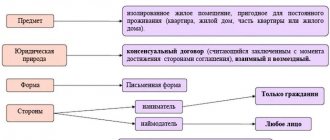A specialized housing stock is being formed and regularly updated in the country, from which housing is provided to needy categories of citizens.
Those in need are not always people who do not have the means to buy an apartment, large families or people with disabilities.
There is a category of citizens who need housing in a specific city due to their service or professional activities.
Those who work in a region or city where they do not have an apartment have the right to receive company housing. It is issued on special grounds.
In cases specified by law, such an apartment can be privatized over time. Local authorities also have grounds for legal eviction from official housing. We will talk about all this in the article.
Service housing - what is it?
Service housing is the area included in the specialized fund of the state or municipality. This occurs on the basis of the relevant decision of the authorized bodies.
The following legal features apply to such housing:
- housing is included in a specialized fund only with the consent of the owner;
- real estate can be provided for use only to those employees who do not have their own property in the specific locality where they have to work;
- if an employee resigns, he is deprived of the right to use official housing (with the exception of low-income citizens);
- the use of real estate as a service property is possible only after it is assigned to the appropriate category;
- the living space must be equipped in accordance with the characteristics of the region in which it is located;
- housing must meet sanitary and technical requirements;
- per resident there cannot be less than 6 m2.
Service housing is available only to certain categories of citizens. The rights of third parties to such real estate are excluded. In accordance with the law, the following may apply for official housing:
- law enforcement officers;
- military;
- constitutional judges;
- deputies of the State Duma and members of the Federation Council;
- employees of the post office, gas service, janitors, mechanics, technicians;
- persons employed in nature reserves, national parks or forestry;
- workers of specialized institutions for children.
If the living space is removed from the specialized fund, it can be re-registered under a social tenancy agreement. The housing authorities of a municipality, federal subject or federal level have the right to make decisions regarding official housing.
Categories of citizens who can receive housing
In Art. 104 of the Housing Code of the Russian Federation states that the categories of citizens who have the right to apply for official housing are established in the housing stock of the Russian Federation or a constituent entity of the Russian Federation.
In particular, such citizens include the following categories of workers:
- Public school and hospital employees. For this category there is a list of certain conditions that they must fulfill in order to receive premises. In particular, this is their consent to work in rural areas. In this case, they can apply for housing at their place of work. For ordinary teachers or doctors, this opportunity is often not provided.
- Military personnel. This category of citizens is one of the most provided with official housing. At the same time, a single serviceman may be provided with a room in a dormitory, and if there is a family (especially if there is a need for frequent moves), a separate apartment is required.
- Law enforcement officers and the Ministry of Emergency Situations. One of the reasons for providing housing is the need for such workers to move frequently due to their work activities.
- Civil servants. In particular, this includes customs and tax workers, as well as judges. A special place is occupied by officials and deputies, who most often receive official housing. In this case, the apartment (or house) must be equipped with everything necessary, in particular, have a telephone. This is due to the importance of the functions performed by these employees, since they are part of the state’s management system.
- Representatives of the housing and communal services sector. In particular, this includes janitors, mechanics or electricians. The main purpose of this is to attract new employees.
Obviously, the provision of housing is an additional incentive for workers and is intended to increase the prestige of professions or jobs that are not particularly in demand among citizens.
For some other employees, this opportunity is rather a privilege for the importance of the functions they perform.
Rights and obligations of the parties
As with any transaction, the hiring of office space is accompanied by an indication of acceptable actions for each of the parties to the contract. Rights and obligations are specified in as much detail as possible and are secured in writing. The main permissible and prohibited actions are contained in the Housing Code.
For the owner
The owner must provide the tenant with living space that is suitable for habitation and meets safety regulations. Other persons must not encroach on the property.
If this is required, the owner carries out repairs to the premises and also prepares the surrounding area. The tenant must have an unimpeded supply of utilities. If something breaks or is destroyed, repairs are carried out at the expense of the owner, and the tenant (if necessary) is provided with other housing.
In some cases, the employer will not lose the right to reside in the provided housing after dismissal or termination of the employment relationship for other reasons. The category of such persons is established by law. If an employee belongs to a preferential category of citizens, the employer reserves the living space assigned to him under the contract or provides another object suitable for living.
There are several circumstances in which termination of employment will not be a reason for terminating the lease of office space. Thus, housing is provided:
- pensioners;
- the family of a military serviceman or law enforcement officer who died or went missing in the performance of official duties;
- employees who received 1st or 2nd group disability while performing work functions or as a result of an occupational disease.
In addition to responsibilities, the owner also has rights. He has the right to demand from the tenant timely payment of utilities and rent, as well as compliance with the rules of residence and careful treatment of the property provided for use.
For the tenant
Tenants of official residential premises are obliged to:
- pay utility bills on time and in full;
- pay rent on time;
- do not infringe on the rights and legitimate interests of neighbors;
- do not use the housing for other purposes;
- do not rent it out to third parties;
- do not use the property for commercial purposes.
If breakdowns or malfunctions occur due to the fault of the tenant, he is obliged to carry out repairs and eliminate all faults. When the owner considers it necessary to carry out major repairs, the tenant has no right to interfere with this. He must vacate the premises by the appointed date.
An employee living in official housing also has certain rights. He can use the property for residence. However, the agreement will not be terminated if there is a change of ownership.
However, if for some reason the tenant needs to move out, he has the right to terminate the contract at any time.
How do you get housing?
How to get official housing is the main question of interest to citizens planning to move for work. The procedure for obtaining office square meters is strictly defined.
Service housing is allocated by decision of the authority of the subject or municipality . The decision is usually made in the form of an order or resolution on the allocation of housing.
When a decision is made, a person authorized by the municipality enters into a rental agreement for office space with a citizen. The premises are transferred to the new owner according to the transfer and acceptance certificate and the technical condition report.
The reports must indicate all identified defects in the premises at the time of its transfer. If any of them are not fixed, the owner will have to repair them at his own expense in the future.
The new owner of the premises is obliged to:
- pay rent for housing;
- pay utility bills;
- carry out routine repairs of the premises at your own expense.
Major repairs are, in turn, paid for by the owner of the premises represented by the municipality. Service housing cannot be rented, sold or exchanged.
What documents are needed for registration?
First of all, to obtain a service apartment, you need to fill out a special application form. A certain list of documents must be attached to it, in particular:
- Passport.
- Work book confirming the fact of employment.
- An extract from the Unified State Register of Real Estate, confirming the fact that there is no living space in this locality.
- Marriage certificate.
- Certificate of family composition indicating all its members.
- Contract or employment agreement.
- Application from the employer.
Copies of submitted documents must be certified by the employer or a notary . Sometimes other documented information may be required.
The application is drawn up in the name of the head of the authority. It contains the details of all family members who plan to live in the apartment with the applicant. With this application, the citizen consents to the processing of personal data.
Features of drawing up an employment contract
There are several features of drafting the text of a residential lease agreement:
- the lessor is the state or municipality;
- the employer becomes a person determined by law;
- the agreement is drawn up in writing;
- the conclusion is possible by agreement with each of the parties;
- has a limited validity period;
- the text must contain a reference to the decision of one of the government bodies to provide premises;
- the agreement does not provide for the possibility of exchange or sublease;
- the rental property is not subject to division;
- the tenant has the right to change the purpose of the living space if it remains in the property for more than 10 years;
- The subject of the agreement can only be the entire property.
The text of the contract must stipulate:
- information about the employer;
- information about the owner;
- detailed description of the subject of the agreement;
- grounds for providing living space;
- type of work activity (a copy of the work record book must be attached);
- type of relationship between the parties to the agreement;
- rights and obligations of the parties;
- contract time;
- level of housing amenities;
- Date of preparation;
- signatures of the parties.
There is a standard contract form approved by Decree of the Government of the Russian Federation of January 26, 2006 No. 42.
Termination of contract
The rental agreement is terminated in the following cases:
- expiration of the employment contract or employment contract;
- termination of labor relations between the employer and the employer;
- purchase by the tenant of his own housing;
- ahead of schedule, at the initiative of one of the parties.
The tenant can terminate the contract and vacate the premises at any time due to moving to another place of residence, change in marital status and for other reasons. He must notify the landlord about this.
Termination of the contract at the initiative of the lessor on the basis of Art. 83, 101 LC RF by court decision. The following circumstances may serve as a basis:
- evasion of the employer from making payments for utilities and rent;
- damage to real estate or property due to the fault of the tenant or members of his family;
- use of the premises for other purposes;
- numerous claims from neighbors, other citizens and legal entities.
The contract may be terminated due to force majeure circumstances when further operation of the premises becomes dangerous. If the agreement is terminated by the court, the tenant must vacate the living space within 3 days.
Legal nuances of official hiring
If it is planned that the premises will soon lose the status of official housing, the employer must be warned about this. Only the owner of the property has the right to make a decision to change the purpose of the living space.
This can happen if, for example, real estate from municipal ownership is transferred to the balance of the state. In such situations, the tenant has the opportunity to re-register the housing as social rent, and, therefore, in the future, its privatization.
In some cases, an employee and his family members receive the right to live in official housing even after their work in the company is completed. This may be due to a difficult financial situation or the citizen’s urgent need for living space.
As a general rule, privatization of official housing is not carried out. However, in some cases this is acceptable. As a rule, privatization is carried out in court. For this purpose, experienced lawyers are involved.
The executed agreement on the rental of residential premises must be preserved until the end of its validity period, that is, as long as it has legal force. If controversial situations arise, the employment contract can become the basis for a court decision.
Particularly noteworthy are issues that relate to the rights of minor citizens, including those born after the signing of an agreement on the rental of official residential premises. By law, the tenant has the right to register his family members in the premises.
There is no need to obtain permission from the owner. It is enough to present a signed employment contract.
Refusal of housing
How to refuse office space? There is a possibility that you will not like the housing provided by the municipality, and you will want to rent a better apartment on your own. You have the right not to use the apartment provided.
The refusal must have a compelling reason and explain the reasons:
- the housing area is less than the standards;
- sanitary-epidemiological or hygienic standards are violated in the apartment;
- new housing significantly worsens existing living conditions.
In cases specified by law, military personnel even have the right to receive monetary compensation instead of official housing.
Eviction from official housing: prospects for legal proceedings
Currently, the legal regulation of relations related to the provision and use of residential premises of a specialized fund is devoted to the independent section IV “Specialized Housing Fund” in the Housing Code of the Russian Federation (LC RF), the provisions of which determine the purpose of each type of specialized housing.
Previously, the basic rules on office residential premises were contained in Art. Art. 101–108 ZhK RSFSR (approved by the Supreme Court of the RSFSR on June 24, 1983 and valid until March 1, 2005) and in other legal acts, some of which may be applied at the present time in the part that does not contradict the currently valid time of the Housing Code of the Russian Federation (see Federal Law of December 29, 2004 No. 189-FZ “On the entry into force of the Housing Code of the Russian Federation”).
By virtue of Art. Art. 92–93 of Section IV of the Housing Code of the Russian Federation, service residential premises belong to the specialized housing stock and are intended for the residence of citizens in connection with the nature of their labor relations with a government body, a local government body, a state unitary enterprise, a state or municipal institution, in connection with their service , appointment to a public position in the Russian Federation or a public position of a constituent entity of the Russian Federation, or in connection with election to elective positions in government bodies or local government bodies.
Those. Service housing is provided not for the purpose of satisfying the housing needs of a citizen, but in connection with the fulfillment of certain responsibilities assumed (work, service, etc.). In this case, service residential premises must be located only in the state or municipal housing stock (Part 2 of Article 92 of the Housing Code of the Russian Federation).
According to Art. 104 of the Housing Code of the Russian Federation, service residential premises are provided to citizens in the form of a residential building or a separate apartment. In the Decree of the Government of the Russian Federation of January 26, 2006 No. 42 “On approval of the rules for classifying residential premises as a specialized housing stock and standard rental agreements for specialized residential premises”, this norm is clarified: “... it is not allowed to allocate rooms for service residential premises in apartments in which several people live tenants and (or) owners of residential premises. Both all the residential premises of such a building and part of the residential premises in this building can be used for service residential premises in an apartment building.”
The basis for the provision of office residential premises is the decision of the owners of such premises (authorized government bodies or authorized local government bodies acting on their behalf) or persons authorized by them (Article 99 of the Housing Code of the Russian Federation).
Meanwhile, it should be borne in mind that, according to Art. 100 of the Housing Code of the Russian Federation, the basis for moving into office residential premises is a lease agreement for specialized residential premises, which is concluded on the basis of a decision of the owners of such premises (authorized government bodies or authorized local government bodies acting on their behalf) or persons authorized by them to provide such premises.
I would like to note that, according to the legislation in force until March 1, 2005, the basis for moving into official residential premises and concluding a lease agreement for official residential premises was an order of the established form (Articles 47, 105 of the RSFSR Housing Code).
The lease agreement for specialized residential premises specifies the family members of the tenant. The rental agreement for specialized residential premises is concluded in writing. Standard rental agreements for specialized residential premises were approved by Decree of the Government of the Russian Federation dated January 26, 2006 No. 42 “On approval of the rules for classifying residential premises as a specialized housing stock and standard rental agreements for specialized residential premises.” The same Resolution approved the Rules for classifying residential premises as a specialized housing stock.
In accordance with Part 5 of Art. 100 of the Housing Code of the Russian Federation, the rules provided for in parts 2–4 of Art. 31, art. 65 and parts 3 and 4 of Art. 67 Housing Code of the Russian Federation.
The basis for eviction from service residential premises, regardless of their type, is the termination or termination of the rental agreement for specialized residential premises, which, as a general rule, entails the eviction of the tenant. Consequently, citizens must vacate the residential premises they occupied under these agreements. In case of refusal to vacate the specified residential premises, citizens are subject to eviction in court without the provision of other residential premises (Part 1 of Article 103 of the Housing Code of the Russian Federation). The exception is the cases provided for in Part 2 of Art. 102 and part 2 of Art. 103 LC RF, as well as Art. 13 Federal Law of December 29, 2004 No. 189-FZ “On the entry into force of the Housing Code of the Russian Federation.”
So, according to Part 2 of Art. 103 of the Housing Code of the Russian Federation cannot be evicted from service residential premises without the provision of other residential premises who are not tenants of residential premises under social tenancy agreements or family members of the tenant of residential premises under a social tenancy agreement, or owners of residential premises or family members of the owner of residential premises and registered with as those in need of residential premises:
1) family members of military personnel, officials, employees of internal affairs bodies, federal security service bodies, customs bodies of the Russian Federation, state fire service bodies, bodies for control of the circulation of narcotic drugs and psychotropic substances, institutions and bodies of the penal system, deceased ( deceased) or missing in action while performing military service or official duties;
2) old age pensioners;
3) family members of an employee who was provided with official living quarters or living quarters in a dormitory and who died;
4) disabled people of group I or II whose disability occurred as a result of a work injury due to the fault of the employer; disabled people of group I or II whose disability occurred as a result of an occupational disease in connection with the performance of work duties; disabled military personnel who have become disabled in group I or II as a result of injury, concussion or injury received during the performance of military service duties or as a result of a disease associated with the performance of military service duties.
Federal Law of February 29, 2012 No. 15-FZ from January 1, 2013, Part 2 of Art. 103 of the Housing Code of the Russian Federation was supplemented with paragraph 5 with the following content: “5. Orphans and children left without parental care, persons from among orphans and children left without parental care cannot be evicted from specialized residential premises without the provision of other comfortable residential premises, which must be located within the boundaries of the relevant locality.” The effect of this change applies to legal relations that arose before the date of entry into force of the specified Federal Law No. 15-FZ, in the event that orphans and children left without parental care, persons from among orphans and children left without parental care , did not exercise their right to provide residential premises until January 1, 2013.
According to Art. 13 Federal Law of December 29, 2004 No. 189-FZ “On the entry into force of the Housing Code of the Russian Federation” citizens who live in service residential premises and residential premises in dormitories provided by before the entry into force of the Housing Code of the Russian Federation, are registered in accordance with paragraph 1 of part 1 of Article 51 of the Housing Code of the Russian Federation as those in need of residential premises provided under social tenancy agreements, or have the right to be registered on this basis if they are evicted was not allowed by law before the Housing Code of the Russian Federation came into force.
In particular, eviction from official residential premises by court may be carried out in the following cases:
1) if the tenant and his family members living with him fail to fulfill their obligations under the lease agreement for specialized residential premises, in particular in cases (clause 4 of article 83, clause 3 of article 101 of the Housing Code of the Russian Federation): – failure by the tenant to pay for the residential premises and (or) utilities for more than six months;
As judicial practice shows, most courts carefully examine the reasons for the resulting debt in payment for living space, based on the fact that they relate to circumstances of legal significance.
– destruction or damage to residential premises by the tenant or other citizens for whose actions he is responsible; – systematic violation of the rights and legitimate interests of neighbors, which makes it impossible to live together in the same residential premises;
As the Supreme Court of the Russian Federation indicated in paragraph 39 of the Resolution of the Plenum of the Supreme Court of the Russian Federation dated July 2, 2009 No. 14 “On some issues that arose in judicial practice when applying the Housing Code of the Russian Federation” (hereinafter referred to as the Resolution), to the systematic violation of rights and legal interests of neighbors by the tenant and (or) members of his family, taking into account the provisions of Part 2 of Art. 1 and part 4 art. 17 of the RF Housing Code should include their repeated, constantly repeated actions to use residential premises without respecting the rights and legitimate interests of citizens living in this residential premises or house, without complying with fire safety requirements, sanitary, hygienic, environmental and other legal requirements, rules for the use of residential premises (for example, listening to music, using TV, playing musical instruments at night in excess of the permissible volume; carrying out repairs, construction work or other actions that disrupt the peace and quiet of citizens at night; violating the rules for keeping pets; committing hooliganism against neighbors actions, etc.).
– use of residential premises for other purposes;
Under the use of residential premises for other purposes, based on the provisions of part 1–3 of Art. 17 of the Housing Code of the Russian Federation, it should be understood that the use of residential premises is not for the residence of citizens, but for other purposes (for example, its use for offices, warehouses, the location of industrial production, keeping and breeding animals), i.e. actual transformation of residential premises into non-residential premises (clause 39 of the Resolution).
2) in the event of the departure of the tenant and his family members to another place of residence (the rental agreement for specialized residential premises is considered in this case to be terminated from the date of departure) (clause 3 of article 83, clause 3 of article 101 of the Housing Code of the Russian Federation);
According to the explanations contained in paragraph. 2 clause 32 of the Resolution, the condition for satisfying the claim in this case will be the establishment of the fact of the plaintiff’s permanent non-residence in the disputed office residential premises, due to his voluntary departure to another place of residence and the waiver of the rights and obligations of the tenant under the rental agreement in the absence of obstacles to the use of this premises .
3) in case of invalidation of the decision to provide specialized residential premises and the lease agreement for specialized residential premises concluded on its basis (clause 1 of Article 99 of the Housing Code of the Russian Federation).
In sub. “c” clause 41 of the Resolution states that violation of the requirements of the Housing Code of the Russian Federation and the Rules for classifying residential premises as a specialized housing stock when making a decision to provide a citizen with specialized residential premises, taking into account the provisions of clause 2, part 3 of Art. 11 and part 2 of Art. 99 of the Housing Code of the Russian Federation may serve as the basis for interested parties to submit a claim in court to recognize this decision, as well as the lease agreement for specialized residential premises concluded on its basis, as invalid and for the eviction of persons living in the residential premises.
However, in most cases, as judicial practice shows, eviction from official residential premises by court is a last resort measure, which is used mainly only in cases of citizens’ refusal to voluntarily vacate these premises.
The following cases can be cited as examples of judicial evictions.
1. In December 2007, state fire service detachment No. 14 filed a lawsuit against Z., Z.G., Z.F. about eviction from a residential premises located at the address: <...>, without providing another residential premises, citing the fact that the disputed residential premises are official, transferred to the operational management of the plaintiff, in 1999 was provided to the employee of the OGPS No. 14 S. Last On November 15, 2000, he left the said residential premises and was deregistered. His wife Z., whose marriage to S. was dissolved on February 28, 2001, and children Z.G., Z.F. remained living in the residential premises. (in relation to children S. was deprived of parental rights on December 17, 2001). Since the defendants refuse to vacate the official residential premises, the plaintiff asked the court to evict the defendants without providing another residential premises.
By the decision of the Megion City Court of the Khanty-Mansiysk Autonomous Okrug - Ugra dated January 10, 2008, the claim was satisfied. By a cassation ruling of the judicial panel for civil cases of the Khanty-Mansiysk Autonomous Okrug - Ugra court dated April 1, 2008, the court decision of January 10, 2008 was canceled and the case was sent for a new trial to the same court with a different composition of judges.
Upon a new consideration of the case, by the decision of the Megion City Court of the Khanty-Mansiysk Autonomous Okrug - Ugra dated May 27, 2008, the claim was rejected. The cassation ruling of the judicial panel for civil cases of the Khanty-Mansiysk Autonomous Okrug - Ugra court dated August 26, 2008 canceled the decision of the first instance court and adopted a new decision, which decided to evict the defendants from the residential premises located at the address: <...>, without providing another living space.
The supervisory complaint filed by Z. raises the issue of canceling the ruling of the judicial panel for civil cases of the Khanty-Mansiysk Autonomous Okrug - Ugra dated August 26, 2008 and transferring the supervisory complaint for consideration at a court hearing of the supervisory court.
In connection with the filed supervisory complaint against these court decisions and doubts about their legality, on December 23, 2008, Judge of the Supreme Court of the Russian Federation V.P. Knyshev the specified case was requested to the Supreme Court of the Russian Federation and, by the ruling of the same judge dated April 29, 2009, was transferred for consideration at a court hearing of the Judicial Collegium for Civil Cases of the Supreme Court of the Russian Federation.
By ruling No. 69-B09-5 dated May 26, 2009, the judicial panel for civil cases of the Supreme Court of the Russian Federation sent the specified case of eviction from a residential premises without the provision of another residential premises for a new trial to the court of first instance, since the defendant’s arguments that before the introduction In accordance with the Housing Code of the Russian Federation, she was a single mother with minor children living with her, and her eviction without the provision of other living quarters was not allowed by law, since she fell under clause 12, part 1, art. 108 of the Housing Code of the RSFSR were not taken into account by the court.
From the above example it follows that if, by the time the Housing Code of the Russian Federation came into force, a person, in the presence of the grounds specified in Article 108 of the RSFSR Housing Code, had the right to the benefits provided for by this norm, then the provisions of Art. 108 Housing Code of the RSFSR and after the entry into force of the Housing Code of the Russian Federation.
2. The administration of the municipal formation “Vsevolozhsk Municipal District” of the Leningrad Region <...> filed a claim with the Vsevolozhsk City Court of the Leningrad Region against M.E., M.G. and M.A. on recognizing them as having lost the right to use residential premises - a three-room apartment <...>, evicting them from the specified apartment and deregistering them.
In substantiating his claims, the plaintiff indicated that the defendant M.E. held the position <…>. In connection with the labor relations of M.E. <…> on the basis of a rental agreement for specialized (office) residential premises, the plaintiff was provided with a three-room apartment <…>. Together with the tenant, members of her family, her husband M.G., moved into the apartment. and daughter M.A. <…> M.E. was relieved of her position and dismissed due to staff reduction. In connection with this, the plaintiff repeatedly sent notices to the defendant about the termination of the tenancy agreement and the need to vacate the disputed apartment. Since the defendants voluntarily did not comply with the owner’s demand to vacate the premises, the plaintiff was forced to go to court.
By the decision of the Vsevolozhsk City Court of the Leningrad Region dated August 23, 2011 M.E., M.G. and M.A. evicted from a three-room apartment <…>. The rest of the claim of the Administration of the municipal formation “Vsevolozhsk Municipal District” of the Leningrad Region was rejected.
Disagreeing with the court's decision, defendant M.E. filed a cassation appeal against the said decision, in which she requests the decision to be cancelled. In support of her complaint, the defendant indicated that the Housing Code of the Russian Federation does not provide for such a basis for terminating the rental agreement for specialized residential premises as termination of labor relations.
By ruling of the Leningrad Regional Court dated October 26, 2011 No. 33-5254/2011, the decision of the Vsevolozhsk City Court of the Leningrad Region dated August 23, 2011 was left unchanged, the cassation appeal of M.E. - without satisfaction. At the same time, the judicial panel for civil cases of the Leningrad Regional Court indicated that termination of labor relations in accordance with Part 3 of Article 104 of the Housing Code of the Russian Federation is the basis for termination of the contract for the rental of office premises. Provided for in Part 2 of Art. 103 of the Housing Code of the Russian Federation there are no grounds on which the defendants could not be evicted from the disputed apartment without the provision of other residential premises. From the above example it follows: the term of the rental contract for office residential premises is determined by the duration of the employment relationship, service or holding an elective position (Part 3 of Article 104 of the Housing Code of the Russian Federation). In accordance with Part 1 of Art. 103 of the Housing Code of the Russian Federation, in cases of termination of rental contracts for specialized residential premises, citizens must vacate the residential premises that they occupied under these contracts.
3. The administration of the closed administrative-territorial entity <…> (hereinafter - ZATO <…>) filed a lawsuit against R.S. and R.E. about their eviction along with R.V.’s minor children. and R.D. from residential premises - apartment No. <…>, located in building No. <…>, without providing another residential premises and deregistration. The requirement was motivated by the fact that the said apartment is municipal property and in 2001 was included in the number of service residential premises. The apartment was provided by R.S. as a soldier performing military service under a contract. In 2002, the defendant was transferred to the reserve early due to organizational and staffing measures. Under the “Providing Housing for Young Families” program in 2009, the defendants were provided with residential premises, but they refuse to vacate the office premises.
By the decision of the Perm District Court dated November 21, 2011, the claims of the ZATO were satisfied.
Disagreeing with the court's decision, the defendants filed a cassation appeal against the said decision, in which they asked the court's decision to be overturned. In support of their complaint, the defendants indicated that the legal relations that arose regarding the use of official residential premises are of a contractual nature, and therefore the provisions of Art. 196 of the Civil Code of the Russian Federation on the three-year limitation period, that the plaintiff missed the limitation period and the provisions of Art. 208 of the Civil Code of the Russian Federation, to which the court referred, in this case, based on the nature of the legal relationship, were not subject to application. In addition, the defendants indicated that their purchase of a 3-room apartment under the “Providing Housing for Young Families” program cannot be grounds for their eviction, since the provisions of Art. Art. 101, 102, 83 of the Housing Code of the Russian Federation do not contain such a basis for terminating a rental agreement for specialized residential premises as the acquisition by tenants of another residential premises into ownership.
By the decision of the Perm Regional Court dated December 28, 2011 in case No. 33-13326, the defendants’ cassation appeal was left unsatisfied.
At the same time, the judicial panel for civil cases of the Perm Regional Court indicated that, since currently the defendant, being a shared owner of a residential premises, is not in the queue of those in need of improved housing conditions and is not among the persons who have the right to be on this register, he is subject to eviction from the official residential premises.
In addition, the panel of judges pointed out that the court’s conclusion that the legal relationship that arose was not subject to the statute of limitations was erroneous. However, the erroneousness of this court’s conclusion does not entail the need to cancel the decision, since in general the court’s conclusion that the plaintiff has not missed the statute of limitations for filing a lawsuit is correct.
From the above example it follows that a citizen is subject to eviction from official residential premises if the reasons for which he was in the queue of those in need of improved housing conditions and was among the persons entitled to be registered with this person no longer exist.
In addition, when disputes arise about eviction from service residential premises, it is necessary to clearly distinguish between housing and civil legal relations, taking into account that the provisions of Article 208 of the Civil Code of the Russian Federation cannot apply to the former, according to which the requirements for the protection of the rights of the owner or possessor of real estate do not apply the general three-year limitation period established by Article 196 of the Civil Code of the Russian Federation, as indicated by the Ruling of the Supreme Court of the Russian Federation of August 19, 2008 No. 5-B08-77
_______________________
- Paragraph 41 of the Resolution of the Plenum of the Supreme Court of the Russian Federation dated July 2, 2009 No. 14 “On some issues that arose in judicial practice when applying the Housing Code of the Russian Federation” // Access from the reference legal system “ConsultantPlus”.
- Decree of the Government of the Russian Federation of January 26, 2006 No. 42 “On approval of the Rules for classifying residential premises as a specialized housing stock and standard rental agreements for specialized residential premises” // Rossiyskaya Gazeta. - No. 34. - 02/17/2006.
- "Russian newspaper". - N 46. - 03/02/2012.
- Paragraph 38 of the Resolution of the Plenum of the Supreme Court of the Russian Federation dated July 2, 2009 No. 14 “On some issues that arose in judicial practice when applying the Housing Code of the Russian Federation” // Access from the reference legal system “ConsultantPlus”.
- Paragraph 39 of the Resolution of the Plenum of the Supreme Court of the Russian Federation dated July 2, 2009 No. 14 “On some issues that arose in judicial practice when applying the Housing Code of the Russian Federation” // Access from the reference legal system “ConsultantPlus”.
- Ruling of the Supreme Court of the Russian Federation dated May 26, 2009 No. 69-B09-5 // Access from the legal reference system “ConsultantPlus”.
- Determination of the Leningrad Regional Court dated October 26, 2011 No. 33-5254/2011 // Access from the reference legal system “ConsultantPlus”.
- Ruling of the Supreme Court of the Russian Federation dated August 19, 2008 No. 5-B08-77 // Access from the reference legal system “ConsultantPlus”.
Unlock access to the private part of Clerk with a Premium subscription. Get hundreds of webinars and online courses, unlimited consultations and other proprietary content for accountants.
Hurry up to subscribe with a 20% discount until October 15, 2021. Read more about “Premium” here.
Who can rent such housing?
Chapters 9 and 10 of the RF Housing Code are devoted to the status of such a fund. And just in part 4 of Art. 100 of this code states directly: the tenant (that is, the person who was provided with official housing) does not have the right to sublet such an apartment.
At the same time, Part 3 of Art. 92 establishes: service and other specialized housing cannot be sold, rented or otherwise used even by the owner. The only option is to conclude a rental agreement in accordance with the purpose of such housing. Thus, even the state or municipal body in charge of using this housing stock cannot rent out office housing - renting is directly prohibited by housing legislation.
IMPORTANT: In common parlance, “official housing” often refers to apartments or rooms owned by commercial organizations and provided by them to their employees - including with the possibility of subsequent transfer of ownership after serving a certain period of time (this, in particular, is practiced by some oil and gas companies).
However, in reality such premises do not have the status of official housing. Their legal status is regulated by ordinary norms - and, with the consent of the organization, they can be taken.
Let's consider below who can rent out an apartment, that is, is it available to military personnel, civil servants and civil servants?
Is this available to military personnel?
Among the citizens who are provided with official residential premises, a category such as military personnel stands out. Can they act as landlords?
Here you need to take into account the provisions of Part 7 of Art. 10 Federal Law “On the status of military personnel.” According to it, a person undergoing military service has no right to engage in business or other paid activity, except creative (pedagogical, scientific, etc.). Accordingly, a military man cannot act as a lessor in a commercial lease agreement.
However, the law does not prohibit military personnel from disposing of property that belongs to them personally if there is no goal of systematically receiving income. In the case of renting or renting an apartment, systematicity will arise only if, over a long period of time, different residents have regularly moved in and out of the apartment - and there will be evidence of this fact.
Given the vagueness of the definition of systematicity in the law, it is unlikely to prove this - and, therefore, in practice there are no obstacles. In any case, this is exactly how the Supreme Court of the Russian Federation considers this issue, whose Plenum on November 18, 2004 issued Resolution No. 23 concerning judicial practice in cases of illegal business activities.
Thus, military personnel can rent out housing. However, the room or apartment must meet the following conditions:
- Belong to them personally (for example, to be purchased with personal funds or with the help of a government subsidy, inherited, etc.).
- Belong to family members not in military service. The law restricts only the military themselves, but not their wives, husbands, brothers, sisters, etc.
- To be purchased as part of a military mortgage - provided that the bank and the state represented by FGKU Rosvoenipoteka did not directly prohibit this in an agreement concluded with a specific military man. Problems are possible here: the state is indifferent to surrender, but some banks directly prohibit such actions in the text of their contracts.
IMPORTANT: If a serviceman rents out his personal housing, then he must also pay personal income tax (clause 4, clause 1, article 208, clause 1, article 209 of the Tax Code of the Russian Federation). Its size will be 13% of the delivery fee received.
At the same time, a military person has no right to rent out a service apartment or rent it. If he does this, he may face the following responsibility:
- Termination of the contract under which a service apartment was provided in accordance with Part 3 of Art. 101 Housing Code of the Russian Federation. This is logical: if a military man rents out premises, it means that he himself does not need housing.
- Recovery of the amount received from the tenant as enrichment received without legal grounds (Article 1102 of the Civil Code of the Russian Federation).
- Punishment for service from the immediate commander within the limits of the powers granted to him by the Disciplinary Charter of the RF Armed Forces.
Civil servants
A similar problem arises if the landlord or tenant is a person in the public service. The same rules apply here as for the military - with the only difference that the ban on entrepreneurship is established by another regulatory act, namely clause 3, part 1, art. 17 Federal Law “On the State Civil Service of the Russian Federation”.
Otherwise the rules are the same:
- You can rent out, but only housing that personally belongs to the employee.
- You need to pay personal income tax.
- Service housing cannot be rented out under any circumstances under the threat of deprivation of this housing and penalties for unjust enrichment.
Now you know whether a civil servant has the right to rent out an apartment or not.
Civil servants
Sometimes there is confusion about the status of employees. The fact is that the terms “civil servant” and “civil servant” are now used simultaneously. It seems to many that there are not many restrictions for the latter, and they can rent out a service apartment.
This is actually a mistake. In fact, based on the content of the Federal Law “On State Civil Service” and specifically Art. 13 of this law, we can conclude: these terms are synonyms. In an extreme case, civil servants can be interpreted as a general status, including those in civil and military service, and a civil servant in this case will act as a special case of this status.
Thus, restrictions apply to civil servants to the same extent and on the same grounds as to civil servants. They cannot rent out office housing either.
Transfer of a departmental apartment to a social one and further privatization
Law No. 1541-1 of 07/04/91 (Article 4) deprives official housing of the right to privatization. It is possible only when real estate is transferred from a special fund to municipal ownership. It is produced only with the consent of the owner. To carry out such an action, the tenant must submit a corresponding application to the landlord, who reviews it within a month.
If a positive decision is made, then the necessary documents are submitted to government authorities and the status of the housing changes. After its transfer to municipal ownership, privatization is carried out in the usual manner prescribed by law.
Another option is to buy out an apartment (house). This possibility must be provided for in the lease agreement. An important condition is to live in the office premises for at least 10 years and have proof of the need for housing. Read more about the nuances and procedure for renting with subsequent purchase here.
There are categories of citizens who cannot be evicted from office premises upon expiration of the tenancy agreement. These include:
- disabled people and participants of the Second World War, as well as disabled people from other military operations;
- disabled workers;
- families of people who died in the line of duty;
- single citizens with young children.
In such cases, office premises are transferred to the social housing fund and a social rental agreement is drawn up.







